I believe in demons.
I believe in angels. I believe in witchdoctors, voices, and the Canaanite god Moloch. I believe in the Scientific Method. I believe in Satan. I believe in total depravity. I believe in common sense and the power of prayer. I believe this because I am a Christian. I believe this because as a child raised in the shadows of volcanoes tilting over Guatemala City, in a culture that syncretized Catholic saints with Mayan gods, I had no reason to believe otherwise.
I believe in supernatural horror as much as I believe in the reliability of my Merrell shoes.
But what I believe is not the same thing as what I like or do not like.

What I do not like is watching horror films at night—or the day—or at any other time. Not Se7en. Not The Ring. Not Poltergeist—at all. I just can't. I tried watching Halloween in high school and I almost died of fright. I couldn't handle the images. I took them too literally. How could I not? People I knew as a child had been harassed by honest-to-God demons. Of two things I was certain in my youth: 1) I did not like horror movies, and 2) Christians did not watch horror movies, not for stylistic reasons but for the theological conviction that we should not. It was verboten.
Migrating to the suburbs of Chicago as a teenager, I discovered a culture of teenagers who watched and loved horror movies. But why? I couldn't understand. What was the fascination? What need did they satisfy? A good laugh? A good scare? Did they not know that these scary things really did exist—on the other side of the veil—with Wormwood and Lucifer in tow?
A Bonanza of Horror
Twenty-some years later, I'm driving down to my local Blockbuster and there, I buy a one-month pass. With it, and despite all my childhood fears, I rent A Nightmare on Elm Street, The Blair Witch Project, Bram Stoker's Dracula, Carrie, Child's Play, The Exorcist, The Shining, Friday the 13th, Species II, Nosferatu and add them to an already-existing list: Psycho, The Others, What Lies Beneath, Alien, Silence of the Lambs, Jaws, Gremlins, Sleepy Hollow. I watch them because I must. The theologian in me who pretends to be a scientist needs an answer. Why in heaven's name do horror movies exist? Where do they come from? What do I, as an Arts Pastor, tell my filmmaking friends when they ask what to do with horror movies?
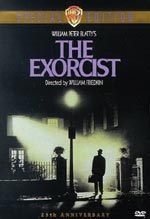
Naturally, I prayed before watching each one. I crossed myself. I said the "Our Father." I sprinkled a dash of holy water on The Exorcist DVD case. Better safe than sorry, I figured.
Sitting there with my eyes scrunched up, squinting at all this blood and terror, I found myself asking: Why don't Christians make any of these? Where are the Christians telling horror stories? Sure, you get a Charles Williams here and a Flannery O'Connor there trafficking in horror, but they're the exception. Is the horror genre simply unredeemable? Is it fallen? Misunderstood? What?
So I decided to go on a quest. A quest! I began with a basic question: What is horror?
Three Fears
Horror, I soon discovered, is a way for us humans to deal with three of our most primal fears: the fear of the dark, whether in the natural or supernatural world; the fear of the future, including our immediate future as well as the far-flung apocalyptic; and the fear of the unknown. Looking at it cock-eyed, I realized that horror has everything to do with things we cannot control. We cannot control demons like the kind we find in The Exorcist or Fallen. We cannot control beasts and forces of unforgivable size, such as Jaws and Aliens. We cannot control the horror we find inside ourselves: the unhinged mind (Dr. Jekyll and Mr. Hyde), the warped spirit (Child's Play), the disturbing wildness of our physical bodies (The Elephant Man).
This is the bad news.
We cannot control the dark, the future, or the unknown. We think we can, but we can't. We try, but to no avail. So we make up stories to harness our fears. We concoct ways to subjugate the terror.
Two Eras
The next stage in my quest led me to ask the question, Before movies, what? How did horror wind itself back through history, art, and literature? Surely humans have been dealing with these fears longer than the era of cinema. After a little bit of rummaging, I found two great eras, one on either side of that continental divide we call the Scientific Revolution (circa 1543). The earlier is the Era of the Grotesque. This is the era that lands us in the medieval period, a time when the heavens hung low upon the earth, when the umbilical cord to the Greek and Teutonic and Hebrew mythologies had not yet been severed. The later is what I'll call the Era of Horror Proper. Here we find ourselves in the age of Newton, Leibniz and the demythologization of all things biblical.
I realized that if I wanted to understand the modern horror flick, I needed first to consider its backdrop, the grotesque.
The Mother Alien of the Genre: The Grotesque
I started with the seminal work of the German critic Wolfgang Kayser, The Grotesque in Art and Literature, written in 1957. In his book, Kayser identifies four premises for understanding the grotesque in medieval art. I found that I could use his framework to make sense of the behavior of horror movies, and that was a happy moment on the quest.
Premise #1: The grotesque is the estranged or alienated world.
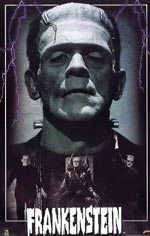
In this world the margin swaps places with the center. The teenage freak, the ostracized weirdo, Carrie White in Carrie, becomes prom queen. Here the four ocular monsters of Revelation 4 roam freely. Here the victims of deformation, the Minotaur, the Wolf Man, Frankenstein's Monster, are at home. Here it is the fear of life—rather than the fear of death—that overwhelms.
Premise #2: The grotesque is experienced as an incomprehensible, inexplicable impersonal force that has no name—
none, that is, that can be identified by scientific man. The grotesque defies logical and physical categories that humans use to make sense of things. Twenty doctors and psychiatrists in The Exorcist cannot explain to Chris McNeil what is wrong with her daughter, Regan. After all of their horrific needle-puncturing and radiation baths, they still cannot name the ailment. She's possessed. But no instrument seems capable of finding the demon. It lies "beyond."
Premise #3: The grotesque is at play with the absurd.
I've always wondered why people laugh when they watch horror movies. I usually found them, well, profoundly un-funny. Why so much comic relief in Shaun of the Dead or Night of the Living Dead? The Russian theorist Mikhail Bakhtin suggests helpfully that the grotesque as a form of carnival sought to expose the inordinate sense of self-importance among the cultural aristocracy and the religious establishment. Clowns, fools, gargoyles and masks, costumes and games and laughter—all of it was a search after freedom. A freedom for what? To be whole. The only way to heal, it seems, was to laugh at our disintegrating pretensions.
Premise #4: The grotesque is an attempt to invoke and to subdue the demonic.
Warner Brothers describes its latest action/suspense/horror flick Constantine in the following way:
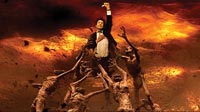
"Born with a gift he didn't want, the ability to recognize the half-breed angels and demons that walk the earth in human camouflage, Constantine (Keanu Reeves) was driven to take his own life to escape the tormenting clarity of his vision. But he failed. Resuscitated against his will, he found himself cast back into the land of the living. Now, marked as an attempted suicide with a temporary lease on life, he patrols the earthly border between heaven and hell, hoping in vain to earn his way to salvation by waging war on the earthbound minions of evil."
The earthbound minions of evil. From the cult of Shiva to the professional exorcists of the Roman Catholic Church, humans have endeavored—by whatever means possible—to protect themselves from demonic evil. In the age of the grotesque, artists "tamed" the demonic by way of colorful metaphors and exaggerated figures.
This, in summary, is how the medieval culture dealt with their horror fears artistically.
When I cross now from the realm of monsters and old wives' tales into the Age of Reason, what then do I find?
From Age to Age
I find that what was once above ground—the macabre, the freaks of nature, the nearness of evil spirits—gets shoved underground, made subject to the mind. I find all that messiness of feelings and supernatural mumbo-jumbo made subservient to a cool and detached reason. But I also find a fierce reaction from the artists against the rationalist's suppression of supernal mysteries.
The Horror!
The artist, the religious seer of the Age of Reason, refuses to accept the pronouncements of the Enlightenment. He sees what the empiricist cannot—he senses the dark, he feels the unknown—and he knows it is true. The witches of Eastwick have not died. They are simply invisible to the eyepiece of science. The instinct for the horrific aspect of life is alive and at large, and the artist must speak what the rationalist refuses to name.
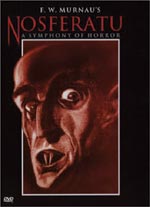
And thus we get the rise of the gothic in the Romantic era in the 18th & 19th centuries, the tales of Edgar Allen Poe, Mary Shelley, and Abraham "Bram" Stoker. We get the old-fashioned horror movies, that protested a narrow-minded naturalism like Nosferatu (1922) and Freaks (1932). We get a reaction to the technological romance popular after WWII in the advent of gore cinema: Bloodfeast (1965), Night of the Living Dead (1965), The Texas Chainsaw Massacre (1974). We get the rebellion against materialism in the slasher films of the '80s and '90s, the Halloween and Friday the 13th franchises, the Scream trilogy, the Scary Movie parodies.
In short, we get a human spirit that resists all attempts to reduce our lives to mere matter, mere facts. We get the irrepressible sixth sense for the supernatural writ large on the silver canvas.
The Question
So I now come back to my original question: Is the horror genre redeemable? Can Christians make use of the form? Should they? I think of evangelicals like Scott Derrickson, director of Hellraiser V: Inferno, whom I first met at a film and theology conference at Fuller Seminary, and I see that in the hands of a sanctified imagination, the horror form, in light of all I discovered in my quest, yes, can become a vehicle for redemption. With films like his, and others, I begin to understand the God-givenness of the form, how it works, why it works.
So what would I tell a member of my congregation if they expressed interest in horror stories? I would probably tell them the following.
One, the form is neutral. Like fantasy or the detective story, we're dealing with conventions and types, devices and symbols that together make up the system that we recognize as a romance or a comedy or any other artistic form. The "natural man" can of course corrupt the horror story, but that does not automatically render the genre immoral or unserviceable to our meaning-making endeavors. We need to understand it before criticizing it.
Two, a lot of horror movies are senseless, stupid, and self-indulgent. No secret here. It's a large canopy, involving everything from a Disneyesque The Others to the gruesome Freddy vs. Jason. In some cases, you don't need to waste your time. In other cases it's goofy, cheesy fun. In still other cases you'll want to be careful. Saint Patrick's phrase, "the knowledge that defiles," applies equally to the movies that we watch as to the rest of our lives.
Three, some of it is dangerous. Evil is real, and the extent to which horror movies deal with evil, whether supernatural or natural, we want to be careful not to treat it lightly—or behave like deists who dismiss it as "just a movie." This doesn't mean we cannot watch it, it simply means we need to be wise and discerning, and in some instances prayerful.
Four, to each his own conscience. What is appropriate for one person in one season of life is not so for another, and we need to give each other permission to respond to the grace we've been given. For some, all horror movies are too much. For others, it's not as much of a challenge.
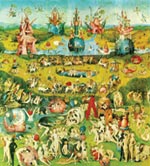
Five, should Christians make horror movies? Yes. And in so doing, they join a goodly company of Christian artists from Hieronymus Bosch (The Garden of Delights) to George MacDonald (Lilith) who have sanctified the culture through their works of horror. Here then I invite the artist to embrace the idea of "true horror."
The Invitation to True Horror
True horror treats good as good and evil as evil. False horror blurs them (so Constantine). True horror seeks to represent evil in all its rottenness, without demurring, without indulging. It reminds us of the slipperiness of evil, that even a saint has the capacity for great acts of evil. True horror dethrones absolute evil, and that is exactly what our relativistic, terrorist-spooked, faux-tolerant society needs.
True horror destabilizes us—carries us to the brink of our limitedness as humans and there forces us to confront the abyss of chaos that surrounds us, from which only God can save us. It questions our inordinate desire for comfort. Suddenness and surprise, staple devices of horror, rebuke our pretensions to control. We think we control things, with our paved highways, insulated homes, electronic gadgetry, but we don't, and the horror story keeps us humble. Horror deals with things beyond our control and thereby opens up for us the possibility of a savior.
True horror reminds us how profoundly moral our universe is. It reminds us, refreshingly, of simple things like good and evil, justice and mercy, courage and cowardice. True horror massages our intuition of the Divine. It reminds us of the great powers we possess to choose and to procreate, and by these choices either enhance or dull our moral intelligence.
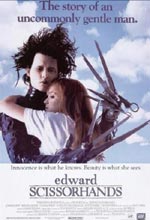
True horror, finally, makes possible an experience of grace. It suggests that we too are misshapen, we too are duped by evil. There is in us all a Mr. Hyde. We are all of us Edward Scissorhands. Looking at our deformed selves in the exaggerated characters on screen, we experience a cathartic release ("Thank God that isn't me!") or a genuine moment of self-knowledge ("Oh God, I need help!") which reminds us of the two-way movement of grace: grace for ourselves, grace for others.
What Lies Beneath
The horror story, in the end, is a reminder that our present reality is disturbed and distorted. In the hands of the Christian, that reminder can become an invitation to redemption. Leave behind your claims to self-sufficiency! Stop trying to manage your life! Quit calling good evil! Do not be afraid of death! The horror story is not an escape from life, in all its wildness and terrible beauty; it is rather a way of walking through it, and as such a reminder that there is meaning, thanks be to God, in the middle of all the horror.
Sure, I still don't like watching horror movies at night, but at least I can rest in peace knowing that some of them are doing some good in the world.
David Taylor is the Arts Minister at Hope Chapel in Austin, Texas, director of The Ragamuffin Film Festival, and author of a series we ran last year about what it means to make a "good, Christian movie."
Copyright © 2005 Christianity Today. Click for reprint information.















